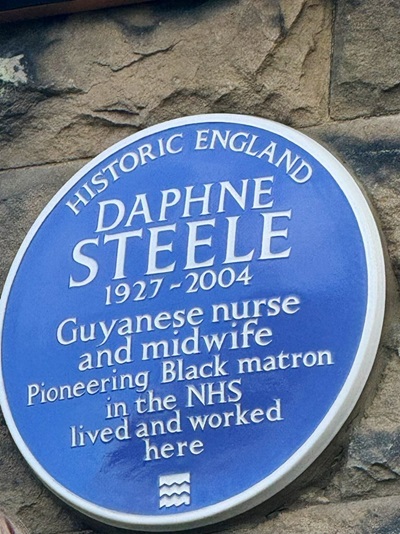Historic England have recently expanded their commemorative blue plaque scheme from covering London, to across the whole of England and it is good to see that the first of these plaques remembered a nurse and midwife, Daphne Steele. I was lucky enough to recently attend the unveiling ceremony in Ilkley, West Yorkshire, together with Sheila Sobrany, RCN President.
I first learnt of Daphne through my membership of the RCN's History of Nursing Forum and its work with the Oxford Dictionary of National Biography, who were keen to expand their biographies of pioneering nurses. I have contributed four biographies to this project, one of whom was Daphne's, and it has been fascinating to find out more about her life and career. I knew that Daphne had come to the UK from Guyana and so through a friend and fellow RCN member, Ann Mitchell (herself a Guyanese nurse), learnt of AGNAP (The Association of Guyanese Nurses & Allied Professionals), of which Daphne had been a member. Their Chair, Betty Why, knew Daphne and was kind enough to share her memories with me and put me in contact with her son, Bob. Meanwhile I also looked at archival sources and searched nursing journals for more information to write my biography of Daphne, which was recently published on the Oxford Dictionary of National Biography website.
Daphne Steele was born in Guyana on 15 October 1927 and was the eldest of nine children. She initially trained as a nurse in the capital, Georgetown, and in 1951, she emigrated to England where she undertook further training at St James’ Hospital in Balham, South London, qualifying as a State Registered Nurse and Registered Midwife. I was interested to find an article in Nursing Standard from 1998 (in an issue to mark the 50th anniversary of the NHS) in which she recalled her experiences.
She went on to work as a nurse and midwife in the USA, at RAF Brize Norton near Oxford and then in Manchester where she was Deputy Matron of the Doriscourt Nursing Home, for mothers and babies. In 1964, at the age of 36, she became the Matron at St Winifred’s Maternity Home in Ilkley. Her appointment received international press attention and in a 2001 interview with her local paper, she recalled that she received over 350 letters of congratulation from the UK and around the world. "I was the first black person in this country to be appointed a matron of any NHS hospital, so that caused quite a stir” she said.
By 1971, St Winifred’s was due for closure and so she undertook training at the University of Leeds as a health visitor, a role she continued until her retirement in 1987 and which gave her much pleasure. One of her sisters, Jeune, who is also a nurse, recalled a shopping trip with Daphne in Ilkley that was constantly interrupted by people asking her sister for heath advice. “She never seemed to be off duty” she said, “She was definitely a people person.”
She lived in Ilkley for over 40 years and was a well-known and active member of the community, including the Soroptimists and Christchurch Methodist Church. Her baking skills, especially her scones, were much enjoyed. In July 2002, aged 74, she was chosen to take part in the Queen's Jubilee Relay Baton, en route to the Commonwealth Games in Manchester. She died suddenly, aged 77, on 23rd July 2004, of post operative complications. In a tribute at her funeral, she was described as, “full of life, generous with a great sense of humour, kind, thoughtful and always willing to help others” and “a trailblazer, a pioneer, a pathfinder.” I wish I had known her but was pleased to honour her memory at this important event.
For more information, pictures of Daphne and the ceremony, see: Daphne Steel.
Historic England are also planning to launch a nomination scheme for further blue plaques across England. Similar schemes also exist in some of the other countries of the UK:
- In Scotland
- Wales does not currently have a national scheme, so plaques are erected by local councils and civic groups.
- In Northern Ireland plaques are placed by Ulster History Circle.
It would be good to see more nurses remembered in this way.



 Share on LinkedIn
Share on LinkedIn




